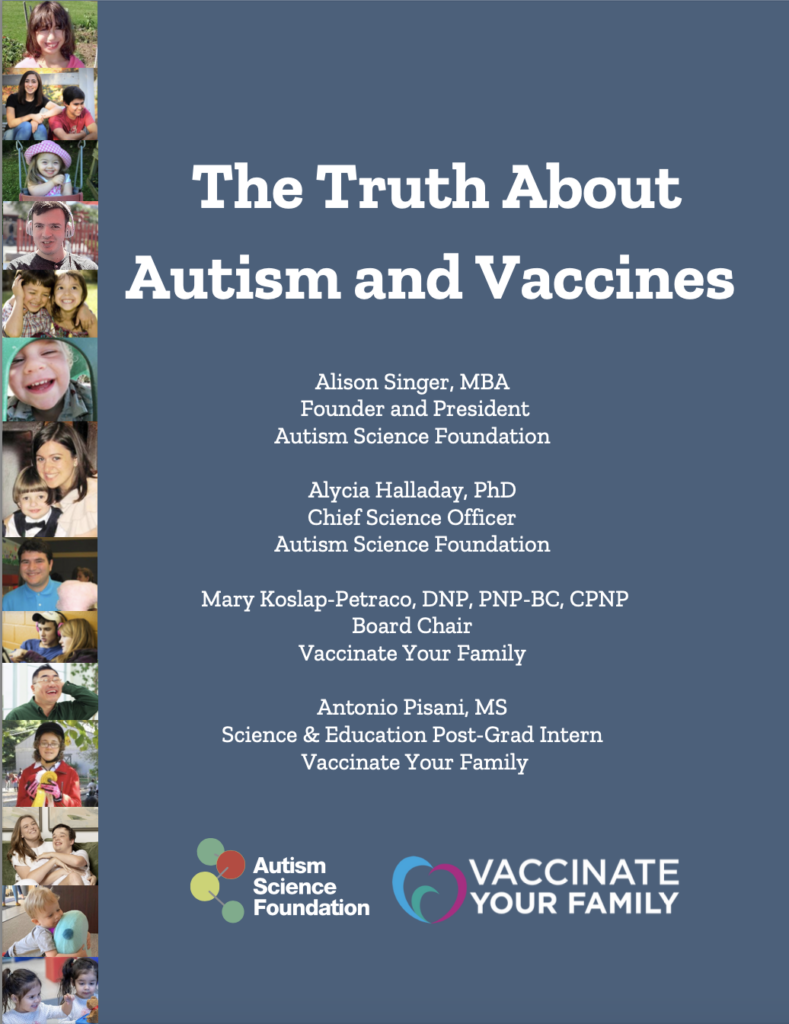The Truth About Autism and Vaccines
Misinformation has a way of sticking around—even when science disproves it. More than two decades after the false claim linking vaccines and autism was first made (and debunked), it remains an idea that makes parents fearful or anxious about vaccinating their young children.
 Fifteen years ago, Every Child By Two (now Vaccinate Your Family) and the Autism Science Foundation teamed up to develop a guide and webinar series to share the science showing no link between vaccines and autism. The guide also provides explanations of autism spectrum disorders and promising science to determine the true causes and paths towards diagnosis and treatments.
Fifteen years ago, Every Child By Two (now Vaccinate Your Family) and the Autism Science Foundation teamed up to develop a guide and webinar series to share the science showing no link between vaccines and autism. The guide also provides explanations of autism spectrum disorders and promising science to determine the true causes and paths towards diagnosis and treatments.
Today we are sharing an updated version of The Truth About Autism and Vaccines which includes sections on:
- Vaccine Safety Research
- Autism 101
- Signs of Autism
- Early Diagnosis
- Evidence– Based Treatments
Debunking the Autism-Vaccine Myth
The myth originated in 1998 when Andrew Wakefield published a fraudulent study claiming a link between autism and the Measles, Mumps and Rubella (MMR) vaccine. His study was later retracted, and he lost his medical license, yet the damage was done. Since then, scientists have spent millions of dollars investigating any potential connection between vaccines and autism—and none has been found.
Studies across the globe have confirmed:
- No link exists between vaccines and autism.
- The ingredients in vaccines do not cause autism.
- The immune response triggered by vaccines does not increase autism risk.
Read the peer-reviewed journal articles here.
In fact, the guide highlights a concerning trend: children with a family history of autism are more likely to be diagnosed—but less likely to be fully vaccinated. The lingering fear of vaccines is putting children at risk for serious, preventable diseases like measles.
What Causes Autism?
While science has ruled out vaccines as a cause of autism, researchers are actively working to understand what does contribute to the condition. Autism is now recognized as a complex disorder with both genetic and environmental factors at play.
Key research findings show that:
- Genetics play a major role—15-20% of autism cases can be traced to specific genetic variations.
- Family history matters—children with an autistic sibling have a 20% higher chance of also being diagnosed.
- Environmental factors contribute—parental age, premature birth, and certain infections during pregnancy have been linked to a higher autism risk.
Learn more about the causes and symptoms of autism, or download the guide.
The Power of Early Diagnosis and Support
Autism is typically diagnosed based on social communication challenges and behavioral traits. According to the National Institute of Mental Health, autism can be diagnosed at any age, but it is described as a “developmental disorder” because symptoms generally appear in the first two years of life. While it’s true that children also receive recommended vaccines to protect against childhood illnesses before age two, studies have repeatedly confirmed that there is no link. This may contribute to how sticky fears around autism and vaccines are – parents whose child receives an autism diagnosis might be looking for answers, and their child is likely to have been vaccinated in a similar time frame.
It’s also true that the number of children diagnosed with autism has risen to 1 in 36, but this increase reflects better awareness and expanded diagnostic criteria rather than a true surge in cases.
Families and care providers can attest – an increase in early diagnosis of autism is actually a good thing. Early intervention leads to better outcomes. Therapies like Applied Behavior Analysis (ABA), speech therapy, and occupational therapy can significantly improve communication and daily living skills.
Unfortunately, many families fall victim to unproven and even dangerous treatments that falsely claim to “cure” autism. The guide warns against therapies like chelation, hyperbaric oxygen, and dietary fads that lack scientific backing.
Get the Facts & Protect Your Child
As vaccine misinformation continues to circulate, the ASF and VYF guide serves as an essential resource for parents, healthcare providers, and educators.
Vaccines save lives. Autism is not caused by vaccines—but vaccine hesitancy can have life-threatening consequences.
For the full breakdown of research, FAQs, and expert guidance, read The Truth About Autism and Vaccines here.
The guide is also available in a printable black and white version.